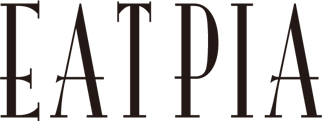EATPIA
今日はランチ営業は休みということでインタビューの時間を12時から割いていただいたのですが、来てみるとシェフが忙しそうに仕事をしていたので驚きました。
相原薫シェフ
今日は余裕をもって少し前に来ていました。
EATPIA
やはり時間をかけて料理を仕込んだり、営業に向けて準備をするのは大切ということなのでしょうか?
相原薫シェフ
はい。そう思います。才能があれば仕事をすぐ憶えたり、あまり時間をかけなくても要領が良ければ仕事ができるようになったりするのかもしれません。でも殆どの人は時間をかけて同じことを何度も繰り返しながら仕事を憶えていきます。
本を読めば知識は頭に入ってきますが、それと料理ができるようになるのは全く別のことです。

自分でも若い頃は先輩たちが来るより早くキッチンに入って、出来ないことや、やってみたいと思うことを練習して、使った食材で賄いを用意していました。才能はなくても体力はあったので、朝早く来ることは苦ではありませんでした。そうやって同じことを繰り返し、何度も失敗しながら、時間をかけて仕事を憶えていきました。
これはシェフや先輩たちに恵まれ、楽しく仕事をさせてもらっていたということでもあります。
しかし必ずしも他のシェフが同じようにして仕事を憶えたわけではないので、シェフによって働き方のスタイルは変わってくるはずです。
思いを込めて
料理を届ける
EATPIA
サンプリシテでの働き方に何か特徴はありますか?
相原薫シェフ
サンプリシテでは常に、その日の料理をつくっていることが求められます。そうでないと、その日に食べに来てくれている人に100%向き合っていないということになると思っています。そうならない為にも、しっかり事前に時間をかけて料理を仕込んでおく必要があります。

個室で食べてもらう料理を仕上げるにしても、それはそれでカウンターで食事しているゲストの方々が見ている前での作業になるので、テキパキと集中して作業することが必要になります。
EATPIA
確かにカウンターに座ってシェフがスタッフと一緒に料理を仕上げていく光景を見ていると何か熱のようなものが伝わってきます。
相原薫シェフ
今まで働いていた店では、当たり前ではありますが、キッチンの中でつくった料理を食べてもらっていました。
でも自分の店のオープン・キッチンで仕事をするようになって、味わってくれる人の目の前で料理を仕上げていると、料理に込めた想いのようなものが前より確実に伝わっていると実感できるようになりました。
なのでサンプリシテでは、事前に時間をかけて料理を仕込んでおくことが大切なだけでなく、カウンターで向き合っているゲストの方々の目の前で料理を仕上げる瞬発力のようなものも求められます。
やはり食べていただく直前に野菜を湯がいたり、肉に火を入れたりした方が見ているゲストにわかりやすく、安心してもらえ、自ずと美味しく感じてもらえるようです。
唯一、最初に味わってもらうアミューズ・ブーシュだけはサプライズ感があった方が良いので、キッチンの横の見えないスペースで仕上げたものを出しています。
過去には
囚われない
EATPIA
サンプリシテのような独自のスタイルをもった店で働くためには何が求められるのでしょうか?
相原薫シェフ
サンプリシテに限らず、どのレストランでも働くに際して大切なのは、そのレストランのスタイルを受け入れる、ということだと思います。
どんなレストランにも必ず何らかの個性があり、個性が際立っているレストランほど高く評価されたりします。そんなレストランではキッチンの中にも独自のスタイルがあります。
これはフランス人の仲間からアドバイスされたことですが、新しい環境に飛び込んだら、今までと違うからといって戸惑ったり、疑問に思ったりすることがあっても、とにかく新しいスタイルを受け入れなければいけません。それまでの経験や知識は捨て、ゼロからやり直すということです。
実際にフランスで気づいたのですが、新しいスタイルを受け入れて、それに慣れてくれば、それまでの自分の考えに方に固執することが無意味にすら思えてきます。
勿論、疑問をもつことは大切です。しかし働き始めたばかりのキッチンで質問したり意見を言ったりしても、誰も相手にしてくれません。取り敢えず、どんなに違和感があっても、新しいスタイルを受け入れて動き始めれば、自ずと疑問は解消されたりするものです。
しっかり仕事をしていれば信頼され、コミュニケーションもとれるようになって、そうなれば質問や意見に耳を傾けてくれるようになります。
せっかく新しいことを学びにきたのに、これができないと「違う店に行けば…」「自分で店やったら…」ということになってしまいます。
妥協は許されない
EATPIA
相原シェフは2000年から2003年に帰国するまでフランスとスイスにある4つのミシュラン星付きのレストランで働いていたのですが、何か驚いたことなどはありましたか?
相原薫シェフ
とにかく無駄がない。朝に仕込んだものはランチで使い切って、午後に仕込んだものはディナーで使い切る。これを繰り返すので、何かを作り置きするようなことはありませんでした。
その時その時のために料理をつくるから美味しくなる。その為にも、常に圧倒的な量の仕事を凄い勢いでこなしていきます。そのペースに自分が追いついていたか自信ありませんが、少なくともクビにはなりませんでした。
そして自分が働いていたレストランのシェフは皆それぞれ個性的だったのですが、絶対に妥協しない、という共通点がありました。
すごく忙しくて時間がなかった夕方に、一生懸命やって仕込んだものを全てシェフに潰されたことがありました。ディナーが始まる30分ほど前に全部やり直しです。
忙しいは言い訳にならない。ダメなものはダメということです。そういった経験は一度だけでしたが、翌日からは、それまで以上に必死になったのを憶えています。
シェフになり
オーナー・シェフになる
EATPIA
相原シェフは以前の店で「雇われシェフ」として6年間にわたり料理を任されていたのですが、当時からオーナー・シェフのような雰囲気がありました。何を思いながら働いていたのでしょうか?
相原薫シェフ
心がけていたのはシェフとして良い料理をつくるだけでなく、喜んでもらえるレストランにしようと意識していました。例えば、食事を終えた人たちが帰られるに際しては、必ずキッチンから出て挨拶をして、少し話を聞きながら料理やサービスへの反応を確かめるといった当たり前のことです。
どこまでオーナーが信頼してくれていたか分かりませんが、かなり自由に料理をさせてもらっていました。
その一方で、自由にやらせてもらっているからこそ、しっかり自分で食材やワインのコストなどを計算して無駄がないように、迷惑をかけないようにしていました。
EATPIA
そういう経験をしてから独立しサンプリシテを開いたわけですが、オーナー・シェフになって初めて実感したことは何かありましたか?
相原薫シェフ
それまでも常にベストを尽くしていたつもりなのですが、やはりオーナー・シェフになって、何をするにしても前よりグッと気持ちが入るようになった気がします。
それは大きな借金をしてでも、自分でやりたいことは自分でやるしかない、ということだと思います。ホテルなど大きな組織の中でステップ・アップしていったり、誰かがスポンサーになって支援してもらえる人もいますが、そこまで恵まれた人は少ししかいないはずです。
自分の料理
で評価を得る
EATPIA
個人的に相原シェフの料理を初めて食べたのは2012年の春だったのですが、当時からミシュランの星に値する料理だと思っていました。しかし実際に星を獲得したのはサンプリシテを開いてから2年ほどたった時に出た2020年度版のミシュラン・ガイドでした。それまで焦りのようなものはなかったのでしょうか?
相原薫シェフ
焦りがなかったと言うと嘘になります。でも現実的に自分の料理には何かが足りないと思っていました。ミシュランの星がついたレストランに行ってみると料理に華があるように思えたり、同じ世代のシェフがつくる料理がとても洗練されていたり、繊細に見えたりしました。
でも自分の料理を変えようと思ったことはありません。とにかく出来ることを確実にやってきました。
EATPIA
フランスやスイスの星付きレストランで厳しい経験をしてきたわけですが、それは今の評価に結びついているのでしょうか?
相原薫シェフ
フランスやスイスだけでなく、今まで全ての経験が役に立っています。どこまで自分のつくる料理がオリジナルなのか自分では何とも言えませんが、少なくとも今まで吸収してきたものを自分なりに表現しているつもりでいます。
EATPIA
そう言えば、頻繁に来てくれるフランス人の方がいると聞いたことがあります。相原シェフの料理の何に惹かれたのでしょうか?
相原薫シェフ
もうフランスに戻ってしまったのですが、かなり頻繁に食べに来てくれました。ソースが美味しいと言ってもらえたのと、フランスでは魚を熟成させて食べるという習慣はないので、そこに興味をもってもらえたようです。
お父様が料理人だったようで、本人も料理するのが趣味で、今でもフランスから自分でつくった料理の写真を送ってきてくれるのですが、まさにプロも裸足といった感じの素晴らしいものです。
東京のレストラン
フランス料理の
価値を引き続き高める
EATPIA
もう何年も前から東京のレストラン・シーンは世界的に高く評価されていますが、その内側にいる相原シェフは東京の何が高く評価されていると思いますか?
相原薫シェフ
海外の人の立場で考えたことがないので、東京のレストランのレベルに関して自分は何とも言えませんが、もしかしたら海外の人が高く評価してくれているのは和食や鮨なのかもしれません。
EATPIA
そうだとすれば評価されているのは必ずしもレストランではなく、伝統的な日本ならではの食文化なのかもしれませんね。
相原薫シェフ
東京にはカジュアルな店から高級店まで食べる場所が星の数ほどあり、信じられないくらい安い値段で美味しいものが食べられたりします。
海外の人もそうかもしれませんが、日本人は職人と呼ばれるような人を高く評価するように思えます。実際に、東京には職人気質のシェフが自ら開いた素晴らしい店が数多くあり、これは鮨や和食、勿論、フレンチだけに限ったことではありません。
しかし素晴らしいシェフがつくる料理を楽しむに相応しいヨーロッパにある3つ星のような、料理だけでなく、サービスも雰囲気も突出したレストランはあまり多くないので、海外にあるような大規模でゴージャスなレストランを東京で開くことは現実的ではないのかもしれません。
まだシェフとして、オーナーとして、失敗ばかりですが、自分としてはフランス料理の価値を少しでも高めるために引き続き努力していかなければいけないと思っています。
EATPIA
緊急事態宣言、不要不急の外出は控えるということで外食頻度が低くなった一方で、「せっかく外食するなら少しでも贅沢がしたい」と言う人が増えたという話があります。相原シェフも同じように感じますか?
相原薫シェフ
そう感じることはありませんが、「やっぱり外で食べるのは楽しい…」「目の前でつくってもらう料理は美味しい…」といった言葉を何度もかけてもらえました。
まだ大変な時期ですが、そう言ってもらえると自分の店を開いて良かったと思えます。

相原シェフのレストラン「サンプリシテ」に関しての詳細は以下のリンク先で見ていただけます。
https://www.eatpia.com/restaurant/Simplicite-Daikanyama-French

Photos by Hiroyuki Takenouchi

他のインタビューは以下のリンク先で見ていただけます。
EATPIA:
We scheduled this interview for 12pm because you told me you weren't serving lunch today. However, I was a bit surprised to see you already busy in the kitchen when I came in. Is that because of the amount of preparation that has to go into the dishes before service time?
Chef Kaoru Aihara:
Yes definitely. I spend long hours on preparation every day. If you are talented or efficient, you could probably learn to do things much more quickly. However, most of us aren’t so fortunate. Therefore, we all have to take the time to repeatedly do the same things over and over to acquire the desired skills.
I remember when I was an aspiring cuisinier, I used to arrive in the kitchen earlier than the others every morning to practice new things, or things I was struggling with. I used real ingredients for practice, then utilized them for staff meals, so nothing went to waste.
I wasn’t naturally talented, so I had to use the energy of youth. I spent a lot of long hours repeating the same things over and over and making mistakes. This is the only way to master your kitchen skills.
Thankfully, I was allowed to do this because of the great chefs I was working with. I feel very lucky in that respect.
EATPIA:
What is Simplicite’s unique working style?
Chef Kaoru Aihara:
At Simplicite, we have to prepare everything every day. This means that our guests are served dishes with elements that were prepared earlier that day, then finished up in our open kitchen for them to see. This is why it is crucial to spend long hours preparing in advance.
Even dishes for our guests for our private dining room are made in the same space. This is why we here have to be organized and professional while cooking.
Serving Dishes
Filled with Passion
EATPIA:
Yes, every time I eat here I watch you and your staff working smoothly together, and I can see that all of you are very passionate about what you do.
Chef Kaoru Aihara:
I hadn’t worked in an open kitchen until Simplicite. I always worked hidden from diners, and didn’t mind it at all. However, as soon as I opened here I realized that diners can actually feel our passion via dishes we cook for them.

Cooking involves long hours preparing dishes, then quickly finishing them up. It takes both patience, and a burst of energy wrapped into one. I can tell our diners enjoy eating boiled vegetables and grilled meat that was cooked in front of them. It obviously adds another layer of connection between us.
However, one exception is our amuse bouche, it’s a bite-size appetizer that is prepared behind the open kitchen. Since it is the first course you taste I feel it should have some surprise elements.
Survival
of The Fittest
EATPIA:
What does it take to work in a unique working environment such as Simplicite’s kitchen?
Chef Kaoru Aihara:
It doesn't matter which restaurant you work for, the most important thing is that you have to accept its unique style. Every restaurant has its own character. The stronger the character, the more people tend to talk about. These types of restaurants always have their own working style inside the kitchen.
When I was young, I was advised by French colleagues that once you stepped into a new environment, you have to accept everything without asking questions or feeling overwhelmed.
This means you have to put aside the knowledge you accumulated before, separate yourself from past kitchens, and start from scratch. I soon realized the truth in this, and learned to adapt and accept new systems quickly.
However, of course it is important to ask. But when you are new in a restaurant nobody takes you seriously, you just have to accept the way things are and start working. After that, in time you will find answers to any of your questions.
Once you start to prove yourself, trust will come, then others will be happy to lend their ear to you. If you cannot do this, you will end up being asked to move on, or suggested you should open your own restaurant.
Never
Compromise
EATPIA:
You have worked at four Michelin starred restaurants in France and Switzerland from 2000 to 2003. Was there anything you were surprised about?
Chef Kaoru Aihara:
I was surprised to see they waste absolutely nothing. Everything prepared in the morning gets used up for lunch. And then you do the same in the afternoon for dinner. This happens day in and day out. Nothing is left unused, and everything tastes great as it’s prepared and eaten on the same day.
However, this also means it’s a heavy workload. Everybody works hard, and at a very fast pace. Looking back, I’m not even sure if I was even able to keep up, but I held my position, so I guess I did ok.
I worked under four chefs who were all different in character. Although, they all had one thing in common, none of them compromised when it came to cooking.
One day, I had to work extremely hard after an unusually long and busy lunch shift preparing items for dinner. I was doing my best within a narrow window of time, but a chef wasn’t happy with what I’d prepared and crushed them all with only 30 minutes to go before dinner service. Therefore I had to redo everything all over again.
Fortunately, this was only a one-off, but I learned a valuable lesson, that if it isn’t good enough, it isn’t good at all. There was no excuse for that no matter how busy I was. After that, I started working much harder than I did before.
Becoming
an Owner Chef
EATPIA:
Prior to opening Simplicite, you spent six years as a chef at a different restaurant, and there were many people who thought you were the owner-chef there, do you know why?
Chef Kaoru Aihara:
It was probably because I was not only trying to come up with my best dishes, but also trying to make the restaurant as good as possible. I made a point of speaking with diners before they left after their lunch or dinner to find out what they thought about our food and service.
I’m not sure to what extent the owner trusted me, but she gave me a lot of freedom in the kitchen, which was really nice of her. In return, I did everything I could within the kitchen not to damage her business.
EATPIA:
What are some things you’ve discovered now that you are an owner-chef?
Chef Kaoru Aihara:
I always thought I was giving my all. However, as soon as I opened here, I found myself even more emotional about everything. On top of borrowing a large amount of money, I was doing what I always wanted to do, and doing it by myself. This showed me, if you want to accomplish something great, you have to take a risk.

Earning
Recognition
with My Own Style
EATPIA:
I first dined at your previous restaurant in the spring of 2012. Even back then many people thought your dishes were worthy of a coveted Michelin star or two. However, you had to wait 7 to 8 years when Michelin Tokyo’s 2020 edition came out. Have you felt pressured?
Chef Kaoru Aihara:
I’d be lying if I said I didn’t feel it back then. I used to go to Michelin starred restaurants and found their dishes had some sort of attractive aura. I even felt some envy that my peers were coming up with dishes more sophisticated and delicate than mine.
However, at the same time I was realistic. I knew there was something lacking in my dishes, and I believed that if I continued what I was doing, I’d get there eventually.
EATPIA:
You were trained at Michelin starred restaurants in France and Switzerland. Do you think your background helps you to get the recognition?
Chef Kaoru Aihara:
Yes. Everything I’ve done so far in Europe and Japan has contributed to what I’m doing now. I am not sure how original my dishes are, but I think they all are based on accumulated experiences.
EATPIA:
You’ve told me before that you had a regular diner who was a French expat. What do you think he liked about Simplicite?
Chef Kaoru Aihara:
While living in Japan he frequented the restaurant often. He told me he liked my sauces. Also, he was very keen to taste the dishes where I used aged fishes, as it’s not customary to do in France.
His father was a chef too, and he also enjoys cooking. In fact, sometimes he sends me pictures of things he’s cooked there in France. They all look amazing, and look like they’ve been cooked by a professional.
Restaurant Scene
in Tokyo
EATPIA:
Tokyo's restaurant scene has been highly appreciated and talked about globally for several years now. However, it’s mainly focused on our traditional food. As an insider, what are your thoughts?
Chef Kaoru Aihara:
It’s hard to tell since I am an insider. I can’t look at it objectively. However, I do think what they appreciate are things like sushi, and washoku, traditional Japanese cuisine.
However, there are so many restaurants in Tokyo beginning at the very casual, to the extremely formal, with everything in between. It's easy to find something that tastes great at a very reasonable price.

In many cultures, including Japanese, people tend to appreciate certain people called shokunin (artisan or craftsman). There are countless restaurants here owned by these chefs who deserve to be called shokunin. I’m not talking exclusively about sushi, washoku, or French restaurants. You see them in all kinds of cuisine.
On the other hand, there are only a few restaurants like Michelin tripled-starred ones you see in Europe, which come with not only great food but also sophisticated service, and a gorgeous atmosphere. It is probably not realistic or feasible to open those large scale restaurants in Tokyo.
What I can do, and would like to do instead, is to continue what I’m doing to enhance the value and status of French cuisine in our culture as a chef and a restaurant owner.
EATPIA:
Since the State of Emergency regarding COVID-19, people have been dining out significantly less frequently. However, I’ve heard some are indulging more. Is this something you’ve noticed?
Chef Kaoru Ihara:
Not really. But our guests have been commenting, it feels great to go out to eat!, or food tastes much better when someone else is cooking in front of me!

Even though we are still going through an extraordinary period of time, every time someone tells me something like this, it makes me proud to be a restaurant owner.
English text edited by Craig Atkinson.

For more information about Chef Kaoru Aihara and his restaurant Simplicite, please follow the links below.
https://www.eatpia.com/restaurant/Simplicite-Daikanyama-French

If you are interested in reading any of our previous interviews, you can also find them at the link below!













